Search
 Video
Video
Unconscious Bias in Patient Care: Harms and Paths to Healing
While physicians intend to treat all their patients with equal respect and compassion, studies show that favoritism and other implicit attitudes can emerge, especially in times of stress, affecting medical decisions and care quality. Video
Video
Burnout Interventions to Benefit Individuals and Systems
Sunita Mutha, MD, discusses common symptoms, the many negative consequences for the health care field, and proven interventions.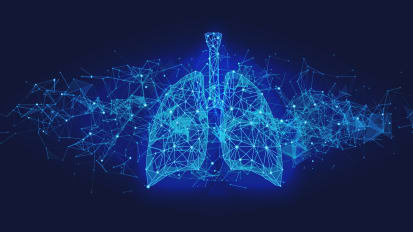 News
News
Lung Transplant Outcomes at UCSF Among the Nation’s Best
For nine consecutive years, the UCSan FranciscoLung Transplant Program has achieved significantly higher-than-expected survival rates following transplant surgery. It is the only lung transplant program in the country with this record.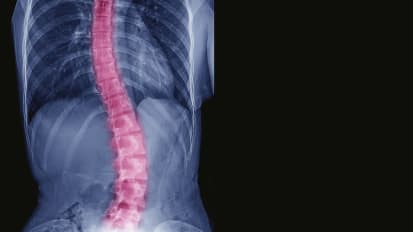 Video
Video
Cervical and Thoracolumbar Spinal Deformity Treatment Strategies, Part III: Case Examples
Lee Tan, MD discusses three recent cervical spine and thoracolumbar spinal deformity cases and the surgical interventions used to treat these diverse conditions.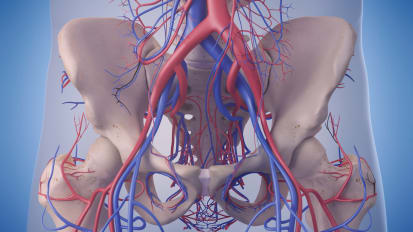 Video
Video
Optimize Spinal Surgery Outcomes Through Teamwork
Vascular surgeon Dr. Charles Eichler discusses UCSF’s success with including vascular surgeons in lumbar fusion procedures and finding the least invasive approach for each patient. Video
Video
Minimally-Invasive Mitral Valve Surgery
Tobias Deuse, MD, discusses the advantages of minimally invasive approaches for the treatment of mitral valve insufficiency. News
News
This New Treatment Can Adjust to Parkinson's Symptoms in Real Time
People with Parkinson’s disease have a new treatment option, thanks to U.S. Food and Drug Administration approval of groundbreaking new technology. News
News
Scientists Discover a New Hormone that Can Build Strong Bones
A newly discovered hormone that keeps the bones of breastfeeding women strong could also help bone fractures heal and treat osteoporosis in the broader population. News
News
Regenerative Medicine Could Soon Transform Treatment of Musculoskeletal Conditions
UCSF’s Brian Feeley, MD, and Xuhui Liu, MD, in collaboration with Kevin Healy, PhD, received a $1.2 million grant for their lab from the California Institute of Regenerative Medicine to continue pursuing their translational research in regenerative medicine.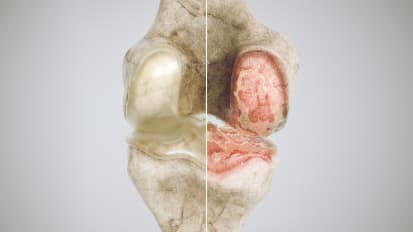 Video
Video
Knee and Hip Replacements: Tips and Tools to Optimize Your Referrals
Noting the prevalence of osteoarthritis and a general lack of consistency in which patients are referred, orthopedic surgeon Claudio Diaz Ledezma, MD, lays out efficient evaluation strategies for primary care providers.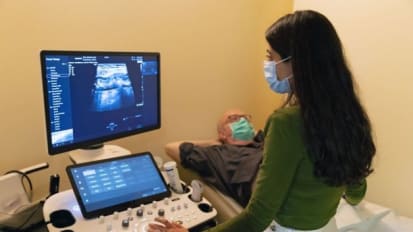 News
News
There’s a More Humane Way to Monitor Crohn's and Colitis Patients
IBD, which comprises Crohn’s disease and ulcerative colitis, affects 1.3% of the U.S. population and accounts for 3 million new diagnoses every year.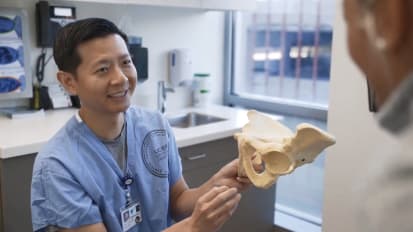 Video
Video
The UCSF Hip Preservation Center: Where Hurting Hips Go to Become Happy Hips
See how our specialists work together and use advanced techniques to address all types of hip injuries in all types of patients, including infants and athletes.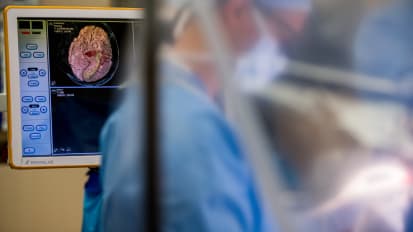 News
News
First “Neuroprosthesis” Restores Words and Mobility to Man with Paralysis
Researchers at UC San Francisco have developed the first “neuroprosthesis” that has enabled a man with severe paralysis to communicate in sentences, translating signals from his brain to the vocal tract directly into words that appear as text on a screen. Aided by this technology, the man is also able to move a robotic arm to manipulate objects. News
News
Saras Ramanathan, MD, Appointed Editor-in-Chief of Journal of Academic Ophthalmology
Saras Ramanathan, MD, has been appointed as Editor-in-Chief of the Journal of Academic Ophthalmology (JAO) News
News
First “Neuroprosthesis” Expands Vocabulary and Mobility for Man With Paralysis in New Milestone
The first “neuroprosthesis,” developed by UCSF researchers in 2021, translates brain signals from a man with severe paralysis directly into words that appear as text on a screen. Using this brain-machine interface, he can also move a robotic arm to manipulate objects. News
News
Best Practices for Implementing Virtual and Hybrid Cardiac Rehabilitation Programs
In a new study, UCSF researchers found that patients participating in either virtual or hybrid cardiac rehabilitation (CR) programs showed similar improvements in functional capacity to those of in-person CR program participants. Hybrid programs combine in-person and virtual delivery. News
News
Katherine Van Loon Named Editor-in-Chief of JCO Global Oncology
Katherine Van Loon, MD, MPH, has been appointed as the next editor-in-chief of JCO Global Oncology (JCO GO), an American Society of Clinical Oncology (ASCO) journal. Video
Video
Know Your Thyroid: Here’s Help With Understanding Nodules and Cancer
Thyroid disease is increasingly common. In this video, UCSF specialists clearly explain the basics of thyroid nodules and thyroid cancer, helping patients make sense of their treatment options, from monitoring to surgery to radioactive iodine.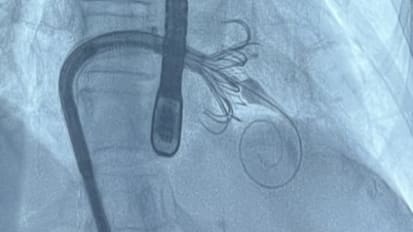 News
News
Novel Tricuspid and Mitral Valve Procedures Improve Patients' Quality of Life
UC San Francisco interventional cardiologists and interventional echocardiographers recently performed two novel minimally invasive cardiac procedures for the first time in the health system.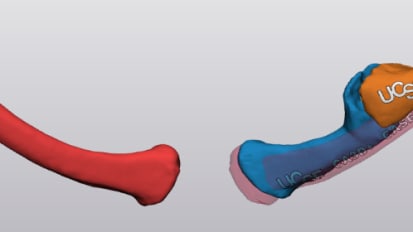 News
News
How 3D-Printed, Patient-Specific Models Reduce Orthopaedic Surgery Time and Improve Patient Outcomes
In this interview, Alexis Dang, MD, talks about the benefits to patients and surgeons and the first time he used a 3D-printed, patient-specific model for surgical planning.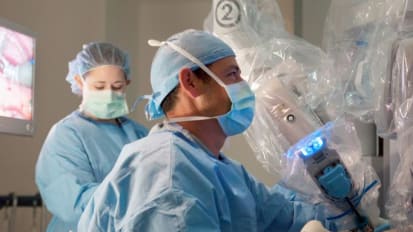 News
News
UCSF Surgeons Perform First Pure Robotic Whipple Surgery in the Bay Area
Gastrointestinal surgeons at UC San Francisco have performed the first pure robotically assisted Whipple surgery in San Francisco. Video
Video
UCSF Osher Center Overview: Integrative Medicine’s Value for Providers and Patients
Sanford C. Newmark, MD, medical director of the UCSF Osher Center for Integrative Medicine, explains what integrative medicine is (hint: it’s neither “alternative medicine” nor homeopathy) and how referred patients can benefit from its proven techniques. Document
Document
Cardio-Oncology & Immunology: Specialized Cardiovascular Care for Cancer Patients
Led by a multidisciplinary team of specialists and researchers, our program optimizes the cardiovascular health of cancer patients and cancer survivors. Document
Document
Interdisciplinary Vasculopathy Care
The UCSF Vasculopathy Clinic provides comprehensive, interdisciplinary care for patients with moyamoya disease, atherosclerosis and other conditions that cause intracranial vasculopathy.

